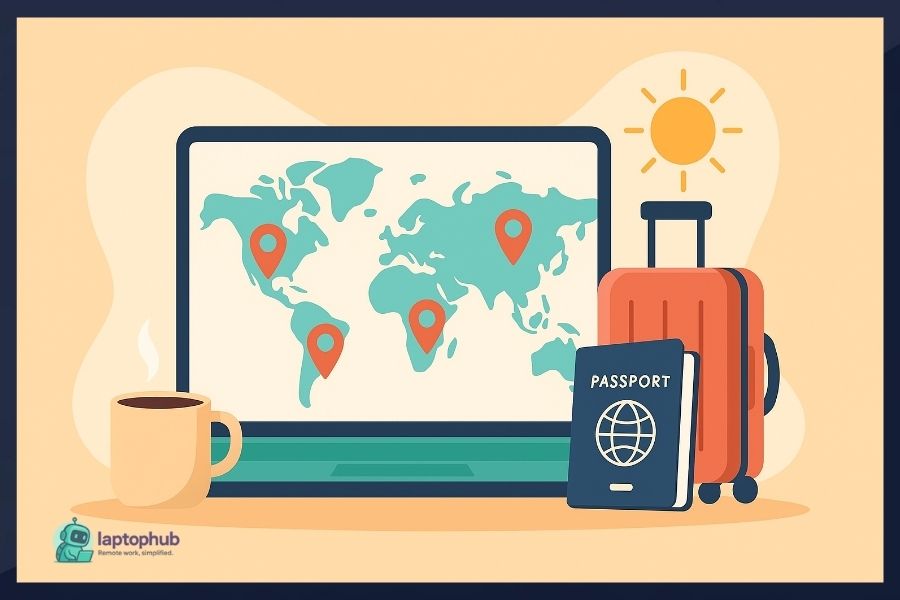The ability to work from anywhere has changed how we live, earn, and explore the world. In 2025, more countries are stepping up to welcome remote professionals by offering streamlined visas, better infrastructure, and communities designed for digital living. These destinations are not just scenic or affordable. They are practical choices that support your work, your health, and your lifestyle. The best countries for remote workers in 2025 are places where opportunity, mobility, and quality of life come together in a way that feels sustainable and inspiring..
💡Key takeaways:
- Countries with favorable visa policies, infrastructure, and lifestyle are attracting remote professionals worldwide.
- Affordability, internet reliability, healthcare, and community are key when choosing where to live and work remotely.
- Locations like Portugal, Thailand, and Estonia stand out for their balance of work accessibility and quality of life.
- Visa types and remote-worker programs differ widely, so understanding entry requirements is essential for planning.
10 Best countries for remote workers
1. Portugal
Visa: D8 Digital Nomad Visa
Top Cities: Lisbon, Porto, Madeira
Why It Stands Out: Affordable living, vibrant culture, strong expat scene
Portugal has been a top destination for digital nomads for years, and its appeal hasn’t faded. The D8 Digital Nomad Visa, introduced to attract foreign remote workers, allows you to stay for up to a year, with options to extend.
Lisbon and Porto are popular for their coastal charm, historic architecture, and affordability compared to other Western European capitals. Madeira, an island with stunning landscapes and fiber-optic internet, has even launched a dedicated digital nomad village.
With its mild climate, solid healthcare, English proficiency, and laid-back lifestyle, Portugal continues to deliver an ideal remote work setup.
| Requirement | Details |
|---|---|
| Visa Type | D8 Digital Nomad Visa |
| Income Requirement | €3,040/month |
| Application Method | Apply via Portuguese consulate |
| Documents Needed | Proof of income, accommodation, health insurance |
2. Spain
Visa: Digital Nomad Visa
Top Cities: Barcelona, Madrid, Valencia
Why It Stands Out: Cultural richness, excellent healthcare, balanced lifestyle
Spain rolled out its Digital Nomad Visa to attract remote workers earning from abroad. Requirements include proof of employment and a minimum income, but the process is streamlined.
Barcelona offers beachside urban living, while Madrid brings cosmopolitan energy and history. Valencia is a rising star, known for its affordability and quality of life.
Remote workers can benefit from Spain’s excellent healthcare system, delicious cuisine, and a strong public transport network. Time zone alignment with much of Europe and parts of Africa makes Spain a smart hub for international collaboration.
| Requirement | Details |
| Visa Type | Digital Nomad Visa |
| Income Requirement | €2,200/month |
| Application Method | Apply at Spanish embassy or consulate |
| Documents Needed | Proof of employment, income verification, background check |
3. Thailand
Visa: Smart Visa
Top Cities: Chiang Mai, Bangkok, Phuket
Why It Stands Out: Low cost of living, natural beauty, well-established nomad hubs
Thailand continues to be one of the best budget-friendly options for digital nomads. The Smart Visa lets skilled professionals stay for up to four years without a work permit.
Chiang Mai remains the go-to spot for digital professionals seeking a peaceful, affordable base. It’s known for its coworking spaces, coffee shops, and tight-knit nomad communities. Bangkok offers a more dynamic, urban environment, while Phuket appeals to those who want beach access and resort living.
Thailand’s warm climate, friendly locals, and strong Wi-Fi coverage in urban areas make it a top pick for remote professionals.
| Requirement | Details |
| Visa Type | Smart Visa |
| Income Requirement | $80,000/year |
| Application Method | Apply via BOI website |
| Documents Needed | Proof of qualifications, contract, health insurance |
4. Mexico
Visa: Temporary Resident Visa
Top Cities: Mexico City, Playa del Carmen, Oaxaca
Why It Stands Out: U.S. time zone alignment, rich culture, great food scene
For North American remote workers, Mexico offers geographical proximity and visa options that make long stays feasible. The Temporary Resident Visa is valid for up to four years and doesn’t require you to work for a local employer.
Mexico City blends tradition and innovation with a thriving tech scene, international cuisine, and coworking spots. Playa del Carmen, known for its beach lifestyle and vibrant digital nomad presence, is ideal for sun-seekers. Oaxaca offers a more laid-back lifestyle with deep cultural roots and great affordability.
Fast internet, strong mobile coverage, and growing coworking infrastructure keep Mexico high on the list.
| Requirement | Details |
| Visa Type | Temporary Resident Visa |
| Income Requirement | $2,600/month or $43,000 in savings |
| Application Method | Apply at Mexican consulate |
| Documents Needed | Proof of income or bank balance, valid passport |
5. Estonia
Visa: Digital Nomad Visa
Top City: Tallinn
Why It Stands Out: Digital-first governance, clean environment, minimal bureaucracy
Estonia was among the first countries to officially recognize the digital nomad movement. Its government offers a simple, transparent process for remote workers to live and work legally.
Tallinn is Estonia’s capital and tech hub, with an efficient public transit system and plenty of green space. Estonia’s famous e-Residency program allows you to open and manage a business completely online.
For freelancers and entrepreneurs who value efficiency and stability, Estonia provides one of the most seamless experiences in Europe.
| Requirement | Details |
| Visa Type | Digital Nomad Visa |
| Income Requirement | €4,500/month |
| Application Method | Apply online or at Estonian embassy |
| Documents Needed | Proof of remote work, income, health insurance |
6. Indonesia (Bali)
Visa: Digital Nomad Visa
Top City: Canggu
Why It Stands Out: Wellness-focused lifestyle, low cost, scenic beauty
Bali is practically synonymous with the digital nomad lifestyle. From Canggu to Ubud, there’s no shortage of coworking spaces, coliving setups, and cafes geared toward remote professionals.
Indonesia recently launched a new visa that permits digital nomads to work from Bali tax-free, provided their income is from overseas. With a lower cost of living, a buzzing expat community, and views of rice paddies and surf spots, Bali offers a balance of work and play.
Be aware of occasional infrastructure gaps and variable Wi-Fi outside city centers, but within the main hubs, you’ll find everything you need.
| Requirement | Details |
| Visa Type | Digital Nomad Visa |
| Income Requirement | Proof of offshore income |
| Application Method | Apply via Indonesia’s immigration portal |
| Documents Needed | Income verification, health insurance, valid passport |
7. Germany
Visa: Freelance Visa (Freiberufler)
Top Cities: Berlin, Munich, Hamburg
Why It Stands Out: Structured systems, rich arts culture, economic stability
Germany’s Freelance Visa is a great path for remote professionals in creative, educational, or tech fields. You’ll need to prove your qualifications, submit contracts or client letters, and register with local authorities.
Berlin is a creative haven with a low cost of living compared to other major European cities. Munich and Hamburg are cleaner and more conservative, but still offer excellent amenities and community support.
Germany stands out for its robust healthcare, reliable internet, and dedication to worker protections—making it a smart choice for long-term stability.
| Requirement | Details |
| Visa Type | Freelance Visa |
| Income Requirement | Proof of sustainable freelance income |
| Application Method | Apply in person at local immigration office |
| Documents Needed | Portfolio, contracts, address in Germany, insurance |
8. New Zealand
Visa: Digital Nomad Visa
Top Cities: Auckland, Wellington
Why It Stands Out: Stunning landscapes, English-speaking, relaxed lifestyle
New Zealand recently launched a new visa targeting remote workers, allowing stays of up to nine months. Income earned abroad is tax-exempt for the first 90 days, making it attractive financially.
Wellington is artistic and compact, while Auckland is more metropolitan with broader international access. Both cities offer clean air, strong coffee culture, and friendly communities.
Its isolation from the rest of the world can be a challenge for frequent travelers, but for those looking for tranquility and quality of life, New Zealand is hard to beat.
| Requirement | Details |
| Visa Type | Digital Nomad Visa |
| Income Requirement | Sufficient funds, no local work allowed |
| Application Method | Apply via New Zealand Immigration |
| Documents Needed | Proof of employment abroad, insurance, return ticket |
9. United Arab Emirates (Dubai)
Visa: Virtual Working Program
Top City: Dubai
Why It Stands Out: Zero income tax, high-tech infrastructure, global appeal
Dubai is positioning itself as the business capital of the Middle East and is actively courting digital nomads. The Virtual Working Program lets you live in the UAE while working for a foreign employer.
Dubai offers blazing-fast internet, luxury housing, gourmet restaurants, and safety. There’s a large international community, so you’ll never feel out of place.
While the cost of living is high, zero income tax and world-class amenities make it worth considering if your income supports the lifestyle.
| Requirement | Details |
| Visa Type | Virtual Working Program |
| Income Requirement | $5,000/month |
| Application Method | Apply online via Dubai’s government portal |
| Documents Needed | Proof of income, insurance, passport with 6-month validity |
10. Taiwan
Visa: Taiwan Employment Gold Card
Top City: Taipei
Why It Stands Out: Excellent public services, fast internet, unique cultural blend
Taiwan’s Gold Card Visa program combines residency, work permission, and multiple-entry rights for professionals with high incomes or specialized skills. It’s a unique opportunity for remote workers who want to base themselves in East Asia.
Taipei is modern and efficient, offering high-speed rail, street food markets, and serene nature escapes. The healthcare system is outstanding, and the society is one of the safest and most respectful in the world.
For remote professionals who want the balance of high-tech living and rich tradition, Taiwan is an underrated gem.
| Requirement | Details |
| Visa Type | Employment Gold Card |
| Income Requirement | NT$160,000/month |
| Application Method | Apply online via Gold Card portal |
| Documents Needed | Qualifications, employment history, passport, insurance |
How to Choose the Right Country for Remote Work
Choosing where to live as a remote worker involves more than just chasing sunny beaches or tax breaks. Here are critical factors to consider:
1. Visa Requirements: Can you legally live and work there as a remote employee or freelancer? What are the income requirements, and how easy is the application process?
2. Cost of Living: Balance your income with local prices for rent, food, transportation, and healthcare.
3. Internet Quality: Fast and reliable internet is essential. Research speeds and infrastructure in your target location.
4. Time Zones: Consider how local hours align with your clients or employer.
5. Community and Networking: A thriving digital nomad or expat community makes it easier to connect and avoid isolation.
6. Safety and Healthcare: Political stability, crime rates, and access to medical care matter more than you think.
7. Language and Culture: Will you be able to navigate daily life? Do you resonate with the local culture?
8. Taxation: Know your tax obligations at home and abroad. Some countries tax foreign income, while others don’t.
Best countries for remote workers FAQs
Portugal consistently ranks among the top for its low cost of living, great visa options, reliable internet, and quality of life.
Yes, most countries now offer specific digital nomad or remote work visas that outline income and duration requirements.
Thailand, Mexico, and Indonesia offer low living costs while providing coworking infrastructure and strong digital nomad communities.
The UAE (Dubai) and some Southeast Asian countries provide tax-free or reduced-tax environments for income earned abroad.
Consider factors like visa options, cost of living, time zone alignment, internet speed, healthcare, and the local remote work community.
Final thoughts
Living as a remote worker is no longer a trend. It is a new standard for how people choose to balance their careers with the life they want to lead. The best countries for remote workers in 2025 offer more than just good Wi-Fi and low rent. They provide structure, legal clarity, access to healthcare, and a chance to be part of something vibrant. The right country will not just support your work. It will change how you experience your time, your freedom, and your future.





